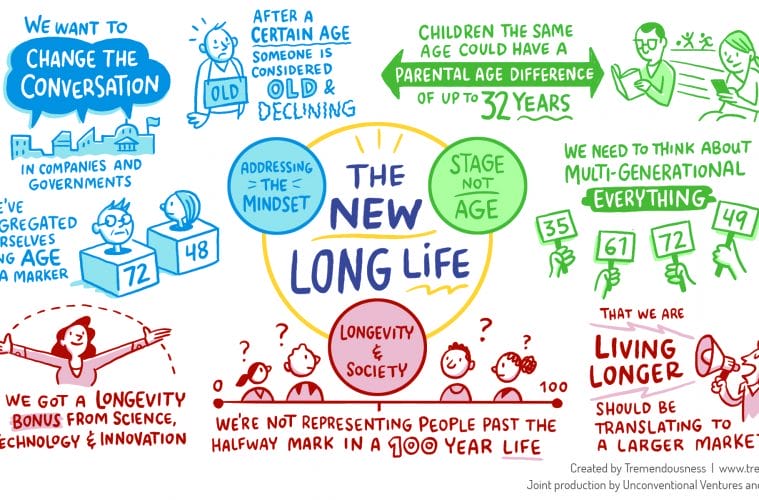Brad and I had the honor to speak at the recent EmTech Caribbean in Santo Domingo, hosted by MIT Tech Review and Universidad Dominicana O&M. The two-day conference included insights shared by twenty-one speakers on topics around technological advances that will revolutionize the world in the coming years, including artificial intelligence, machine learning, personalized medicine, renewable energy, and robotics. We shared our thoughts on the impact of emerging technologies on global issues such as longevity and financial inclusion; the enthusiastic and passionate engagement that we received was humbling.
As it turns out, a lot of the challenges that we experience in the US is not unique to us. For example, the population in the Dominican Republic is expected to increase from around 10.7 million to over 12 million by 2030, driven largely by a growing population aged 60 and older. Around the world, countries including Japan, China, Finland, Italy, and UK are grappling with the impact of an aging society, and the challenges around accessibility, housing, healthcare, and financial well-being. In Finland for example, those who are older than 65 surpassed those who are under 14. Between now and 2050, the number of Americans over 65 will double, and about 25 percent of the world’s population will be over 60.
Which brings the question – is 60 still considered old when we have another 30 years to live? Should mandatory retirement apply if we still have more productive years ahead of us?
How old is old?
Stage not age
Perhaps it is time to re-define “old age”. As the number of people living well into 100 years and beyond increases , it is no longer meaningful to classify the entire group aged 55 and above as “old”. With the longevity bonus that we have gained through advances in science and technology, most people that are in their 50s, 60s, or even 70s are still active, both mentally and physically, with plenty to give. They are culturally, socially, technologically, and economically connected, and are active contributors to the longevity economy.
Instead of treating aging as a silver tsunami and a decline, it would perhaps be helpful to reconsider our relationship with money, and how we define work and retirement. Rather than a liability, the older population is an asset to the society, and we must strive to understand how we could benefit from their presence, their wisdom, and their life experiences. By being more intentional in promoting this new normal, we can perhaps overcome our own biases. After all, as Greek historian Diodorus Siculus said: “Knowledge of history … endows the young with the wisdom of the aged.”
Respecting and caring for our seniors go beyond obligations and duties; to be able to give back to the society is an honor and privilege. All that we learn from caring for one another help us grow and become better versions of ourselves. In this era where we seek to digitize our lives in every way we can – we must not forget what makes us humans, and the value of families, traditions, and relationships.
***
Listen in to our conversation with Bradley Schurman and Lilian Myers of EconomyFour, on our next episode of Shades of Grey on iTunes and Spotify, as we talk about the new old age.
Join us May 15th for the inaugural FinTech4Life where we explore the future of financial services for the world’s fastest growing and wealthiest customer segment.
If you would like to have your company featured in the Irish Tech News Business Showcase, get in contact with us at [email protected] or on Twitter: @SimonCocking
More about Irish Tech News
Irish Tech News are Ireland’s No. 1 Online Tech Publication and often Ireland’s No.1 Tech Podcast too.
You can find hundreds of fantastic previous episodes and subscribe using whatever platform you like via our Anchor.fm page here: https://anchor.fm/irish-tech-news
If you’d like to be featured in an upcoming Podcast email us at [email protected] now to discuss.
Irish Tech News have a range of services available to help promote your business. Why not drop us a line at [email protected] now to find out more about how we can help you reach our audience.
You can also find and follow us on Twitter, LinkedIn, Facebook, Instagram, TikTok and Snapchat.

